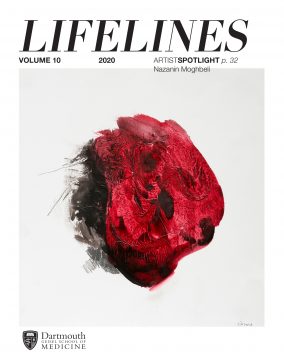Summer 2020 marks the revival of Lifelines, Geisel School of Medicine’s literary and art journal. Freely distributed to hospitals, clinics, assisted living facilities, schools, and libraries in New Hampshire and Vermont, the journal connects healthcare providers and patients through narratives in medicine.
Dartmouth College’s focus on the liberal arts is evident in Geisel’s curriculum—it is one of few medical schools that support a student-edited print publication of work by medical students and physicians interested in the humanities.
“A medical school affiliated with a liberal arts college is rare, and a medical school that takes the liberal arts seriously is exceptional,” says Colin McLeish ’22, one of the journal’s three chief editors along with Renisa Ramnath ’22 and Diana Lee ’22. “When I began looking at medical schools those values were important to me—Lifelines stood out as an example of how medical students stay involved with what they love.”
 When she received a copy of Lifelines in her welcome packet on interview day, Ramnath says she knew it was something she wanted to be part of. “I had been a Medical Humanities minor as an undergrad and we talked a lot about the benefits of narrative medicine for patients, providers, and family members,” she says.
When she received a copy of Lifelines in her welcome packet on interview day, Ramnath says she knew it was something she wanted to be part of. “I had been a Medical Humanities minor as an undergrad and we talked a lot about the benefits of narrative medicine for patients, providers, and family members,” she says.
This year, the journal reached beyond Dartmouth’s community of writers and artists with a national call for submissions that either address or represent the experience of illness or the practice of medicine—the editors received a record number of prose, poetry, and original artwork submissions.
“Having the opportunity to work alongside Colin and Diana has been an incredible experience,” Ramnath says. “We had an unprecedented volume of high-quality submissions—meeting with other students, faculty, and community members who are passionate about literature and art to review the submissions was a welcomed break from the routine of medical school. I’m excited for us to share the final product.”
Reading through the submissions, Lee says she learned a great deal from each piece, whether it was relating to ideas or seeing a novel perspective. “The journal provides a unique medium for patients, doctors, medical students, and community members to come together and share their perspectives in medicine. Being a part of Lifelines has inspired me to refuel my hobby of reflective writing,” she says.
Earlier this year, Lee learned she was runner-up for Stanford’s Irvin D. Yalom Literary Award 2020 in poetry for her poem, “Faces.” And McLeish was selected as a finalist for the same award for his poem, “Outside the Room of a Patient.” Given by The Pegasus Review, a medical literary journal produced by the Stanford School of Medicine, the award recognizes exceptional work in poetry, fiction, and non-fiction writing describing an experience in medicine.
McLeish, who studied English and wrote for his college’s literary magazine, says Lifelines addresses the role of stories in medicine. “The journal is a collection of voices, scenes, and insights into life and its disturbances. At Geisel there is, and has long been, a crucial focus on the patient’s person.
“I’m so proud of our school, students, and physicians who are embracing their artistic life,” he says.